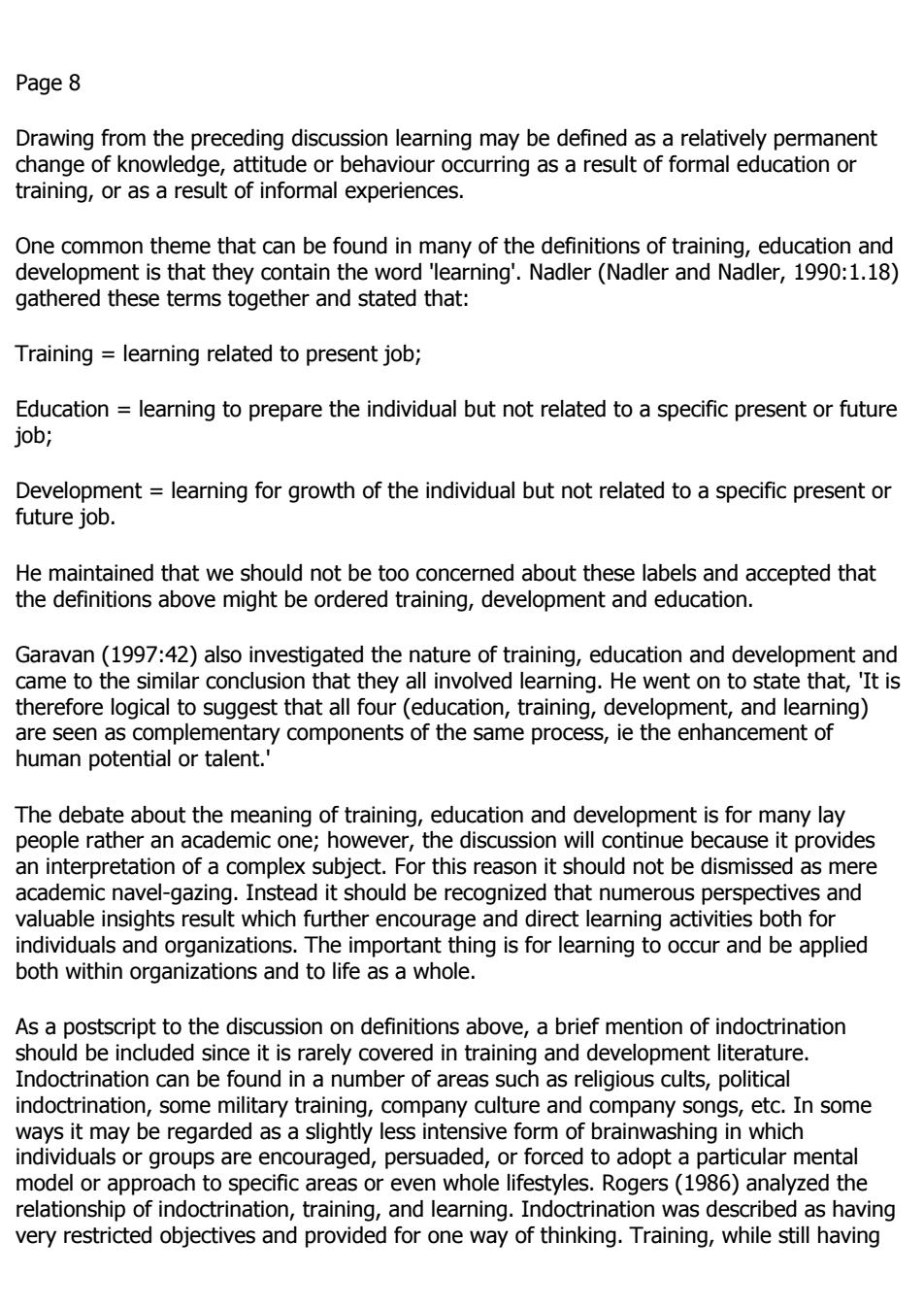
Commission,1981:15)
Commission, 1981:15)

Page 7 This definitior uently broadened from 'a person's ability'to 'an individual's or a group's ability'(MSC,1985:9)thus reflecting the growing concept of organizational learning: Development occurs when a gain in experience is effectively combined with the conceptual understanding that can illuminate it,giving increased confidence both to act and to perceive how such action relates to its context.(Bolton,1995:15) It can be seen from the definitions that development indicates movement to an improved situation that for the individual means advancing towards the physical and mental potential Learning Although both learning in general and adult learning are considered in greater depth in Chapters 10 and 11 it is necessary here to provide a definition in order to contribute towards the picture of HRD.Handy(1990:63)considered learning as being a natural response to coping with change and stated that,'I am more and more sure that those who are in love with learning are in love with life.For them change is never a problem,never a threat,just another exciting opportunity.' Learning can occur in formal settings such as a unive ersity or organizational training centres but it can also occur less formally.Nadler(Nadler and Nadler,1990)distinguished between what he called 'incidental'learning and 'intentional learning'.Incidental learning is to be learning which occurs during the course of doing other things such as reading,talking with others,travelling,etc. Learning and possessing a knowledge of something is one thing but applying the learning is is only the possibility of learning which may happen.He emphasized that: HRD cannot and should not promise that as a result of the learning experience performance will change.This might sound like a radical statement until we look at the false promises that some in HRD have made. Nadler maintained that performance is based on a variety of factors and the majority of these are not the responsibility of those who work in the HRD department.This pragmatic view of the application of learning does not only relate to the recent demands of organizational objectives,it can also apply in a philosophical sense.The Victorian philosopher and naturalist,John Ruskin,remarked that,'What we know,or what we believe,or what we think,is in the end of little consequence.The only consequence is what
Page 7 This definition was subsequently broadened from 'a person's ability' to 'an individual's or a group's ability' (MSC, 1985:9) thus reflecting the growing concept of organizational learning: Development occurs when a gain in experience is effectively combined with the conceptual understanding that can illuminate it, giving increased confidence both to act and to perceive how such action relates to its context. (Bolton, 1995:15) It can be seen from the definitions that development indicates movement to an improved situation that for the individual means advancing towards the physical and mental potential we all possess. In many respects development indicates growth and movement by the learner rather than learning itself, which we will consider next. Learning Although both learning in general and adult learning are considered in greater depth in Chapters 10 and 11 it is necessary here to provide a definition in order to contribute towards the picture of HRD. Handy (1990:63) considered learning as being a natural response to coping with change and stated that, 'I am more and more sure that those who are in love with learning are in love with life. For them change is never a problem, never a threat, just another exciting opportunity.' Learning can occur in formal settings such as a university or organizational training centres but it can also occur less formally. Nadler (Nadler and Nadler, 1990) distinguished between what he called 'incidental' learning and 'intentional learning'. Incidental learning is considered to be learning which occurs during the course of doing other things such as reading, talking with others, travelling, etc. Learning and possessing a knowledge of something is one thing but applying the learning is yet another; thus, learning has limited value unless it is put into practice. Nadler (Nadler and Nadler, 1990:1.5) drew attention to the fact that learning is not guaranteed and that it is only the possibility of learning which may happen. He emphasized that: HRD cannot and should not promise that as a result of the learning experience performance will change. This might sound like a radical statement until we look at the false promises that some in HRD have made. Nadler maintained that performance is based on a variety of factors and the majority of these are not the responsibility of those who work in the HRD department. This pragmatic view of the application of learning does not only relate to the recent demands of organizational objectives, it can also apply in a philosophical sense. The Victorian philosopher and naturalist, John Ruskin, remarked that, 'What we know, or what we believe, or what we think, is in the end of little consequence. The only consequence is what

we do
we do

Page 8 Drawing from the preceding discussion learning may be defined as a relatively permanent change of knowledge,attitude or behaviour occurring as a result of formal education or trainina.or as a result of informal experiences. One common theme that can be found in many of the definitions of training,education and development is that they contain the word 'learning'.Nadler(Nadler and Nadler,1990:1.18) gathered these terms together and stated that: Training learning related to present job; Education learning to prepare the individual but not related to a specific present or future job; Development learning for growth of the individual but not related to a specific present or future job He maintained that we should not be too concerned about these labels and accepted that the definitions above might be ordered training,development and education. Garavan (1997:42)also investigated the nature of training,education and development and came to the similar concusion that they all involved learning.He went on to state that,'Itis therefore logical to suggest that all four(education,training,development,and learning) are seen as complementary components of the same process,ie the enhancement of human potential or talent. The debate about the meaning of training,education and development is for many lay people rather an academic one;however,the discussion will continue because it provides an interpretation of a complex subject.For this reason it should not be dismissed as mere academic navel-gazing.Instead it should be recognized that numerous pe spectives and valuable insights result which further encourage and direct learning activities both for individuals and organizations.The important thing is for learning to occur and be applied both within organizations and to life as a whole As a postscript to the discussion on definitions above,a brief mention of indoctrination should be included since it is rarely covered in training and development literature. Indoctrination can be found in a number of areas such as religious cults,political indoctrination,some military training,company culture and company songs,etc.In some ways it may be regarded as a slightly less intensive form of brainwashing in which individuals or groups are encouraged,persuaded,or forced to adopt a particular mental model or approach to specific areas or even whole lifestyles.Rogers(1986)analyzed the relationship of indoctrination,training,and learning.Indoctrination was described as having very restricted objectives and provided for one way of thinking.Training,while still having
Page 8 Drawing from the preceding discussion learning may be defined as a relatively permanent change of knowledge, attitude or behaviour occurring as a result of formal education or training, or as a result of informal experiences. One common theme that can be found in many of the definitions of training, education and development is that they contain the word 'learning'. Nadler (Nadler and Nadler, 1990:1.18) gathered these terms together and stated that: Training = learning related to present job; Education = learning to prepare the individual but not related to a specific present or future job; Development = learning for growth of the individual but not related to a specific present or future job. He maintained that we should not be too concerned about these labels and accepted that the definitions above might be ordered training, development and education. Garavan (1997:42) also investigated the nature of training, education and development and came to the similar conclusion that they all involved learning. He went on to state that, 'It is therefore logical to suggest that all four (education, training, development, and learning) are seen as complementary components of the same process, ie the enhancement of human potential or talent.' The debate about the meaning of training, education and development is for many lay people rather an academic one; however, the discussion will continue because it provides an interpretation of a complex subject. For this reason it should not be dismissed as mere academic navel-gazing. Instead it should be recognized that numerous perspectives and valuable insights result which further encourage and direct learning activities both for individuals and organizations. The important thing is for learning to occur and be applied both within organizations and to life as a whole. As a postscript to the discussion on definitions above, a brief mention of indoctrination should be included since it is rarely covered in training and development literature. Indoctrination can be found in a number of areas such as religious cults, political indoctrination, some military training, company culture and company songs, etc. In some ways it may be regarded as a slightly less intensive form of brainwashing in which individuals or groups are encouraged, persuaded, or forced to adopt a particular mental model or approach to specific areas or even whole lifestyles. Rogers (1986) analyzed the relationship of indoctrination, training, and learning. Indoctrination was described as having very restricted objectives and provided for one way of thinking. Training, while still having

narrow goals,allowed slightly broader thinking,and learning had the least constraints and tolerated diverse ways of thinking
narrow goals, allowed slightly broader thinking, and learning had the least constraints and tolerated diverse ways of thinking